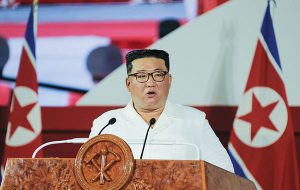Bloomberg
Kim Jong Un expanded the circumstances under which North Korea would launch a nuclear strike — including attacking automatically if his leadership is threatened — further raising the stakes for any military confrontation with the US and its allies.
North Korea laid out its new nuclear doctrine in a law approved by the Supreme People’s Congress in Pyongyang, according to the state-run Korean Central News Agency. The legislation, which replaces a less expansive law passed in 2013, outlines five conditions for using weapons of mass destruction, including in response to conventional attacks on state leaders and to prevent the “expansion or protraction†of a conflict.
The legislation codifies a looser nuclear doctrine articulated by Kim as early as April, when he said the country’s strategic rocket forces have a “second mission†in addition to deterring wars. The shift appeared aimed at protecting Kim himself, whose administration has long accused the US and South Korea of seeking regime change in Pyongyang.
Kim’s regime has stepped up its warnings towards Washington and Seoul since South Korean President Yoon Suk Yeol’s election in March. Yoon has promised to take a harder line against Pyongyang than his pro-reconciliation predecessor, and during the campaign said he would support a pre-emptive strike to prevent a missile attack from the north.
The North Korean legislation may deepen concerns about the risks of miscalculation or an unintended nuclear conflict in the Asia-Pacific region. While it gives Kim sole control over the country’s nuclear forces, it also authorises a system for an attack to be “launched automatically and immediately†if the command-and-control structure is in danger. The shift comes amid global calls for renewed arms-control efforts after Russian warnings about the risk of nuclear war over Ukraine.
, reports of China’s expanding atomic arsenal and the US’s withdrawal from key agreements. The world’s nuclear states are set to boost their arsenals in the next decade, even as the number of such weapons fell last year, the Stockholm International Peace Research Institute said in June.
“They are elevating a nuclear-deterrent policy to a nuclear-combat policy,†said Kim Tae-woo, a military analyst who previously headed the Korea Institute for National Unification in Seoul. “It’s a highly effective, low-cost strategy to deter attacks on Kim.â€
The legislation came a day ahead of the 74th anniversary of the country’s founding Friday, a date which has coincided with past shows of military power by the regime. Chinese President Xi Jinping and Russia’s Vladimir Putin were among leaders to mark the occasion with messages to Kim, with both men similarly calling for bolstering ties with the nation.
In a speech to parliament, Kim reaffirmed his refusal to abandon his nuclear arsenal, despite his 2018 pledge with former US President Donald Trump to “work toward complete denuclearization of the Korean Peninsula.†North Korea has so far rejected President Joe Biden’s calls for Kim to return to talks.
“By legislating the nuclear force policy, our nation’s status as a nuclear arms state has become irreversible,†Kim told lawmakers. “We will never give up nuclear arms or denuclearize first, and we have nothing to bargain with in any negotiations.â€
Kim’s arrival in the chamber was greeted by cheers of “Hurrah!,†KCNA said, describing the reaction as a “token of their deep reverence for him, symbol of all victories and glory of socialist Korea.â€
 The Gulf Time Newspaper One of the finest business newspapers in the UAE brought to you by our professional writers and editors.
The Gulf Time Newspaper One of the finest business newspapers in the UAE brought to you by our professional writers and editors.
